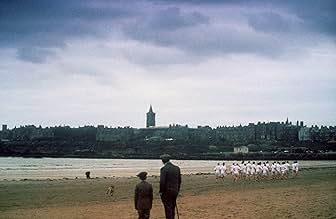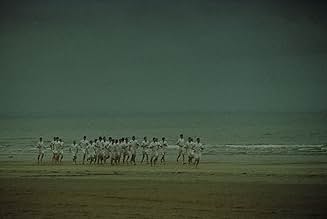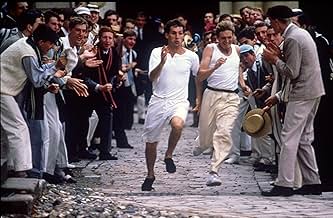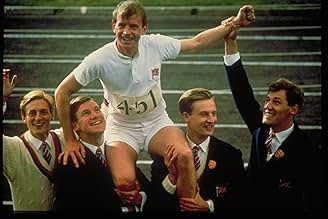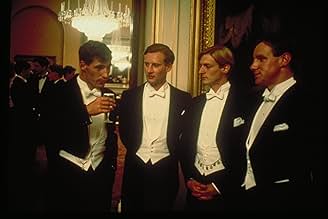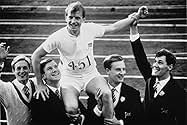Zwei britische Leichtathleten, einer ein frommer Jude und der andere ein frommer Christ, nehmen an den Olympischen Spielen 1924 teil.Zwei britische Leichtathleten, einer ein frommer Jude und der andere ein frommer Christ, nehmen an den Olympischen Spielen 1924 teil.Zwei britische Leichtathleten, einer ein frommer Jude und der andere ein frommer Christ, nehmen an den Olympischen Spielen 1924 teil.
- 4 Oscars gewonnen
- 18 Gewinne & 19 Nominierungen insgesamt
John Gielgud
- Master of Trinity
- (as Sir John Gielgud)
Best Picture Winners by Year
Best Picture Winners by Year
See the complete list of Best Picture winners. For fun, use the "sort order" function to rank by IMDb rating and other criteria.
Handlung
WUSSTEST DU SCHON:
- WissenswertesEric Liddell was born in China, where his parents were missionaries. He returned as a missionary. During the Japanese occupation of China, he was taken into the Japanese Weihsien Internment Camp, where he died from a brain tumor just before the camp was liberated.
- PatzerWhen signing an autograph for a young fan, Eric Liddell does not unscrew or remove any cap from the pen he uses. As all fountain pens have caps, he seems to be using a modern day ballpoint pen which was not invented until 1938.
- Zitate
Eric Liddell: I believe God made me for a purpose - but He also made me fast. And when I run, I feel His pleasure.
- Alternative VersionenThere is at least one slightly different version of the movie, issued in Europe on homevideo. The beginning is different - shorter - and introduces Harold Abrahams while playing cricket with his colleagues. The scene in the train station, where Monty meets Harold is absent, as well as the loading of the baggage in the taxi they share. We simply see Monty writing a letter to his parents, mentioning that "Harold is as intense as ever" (cut to the cricket scene, maybe 30 seconds long), and then continues with "I remember our first day... we shared a taxi together" (cut to the two students unloading their stuff from the car). This alternate version also have slightly different end credits, and does not mention Harold marrying Sybil. The differences are minor (the U.S. version provides a more shocking memento of WWI, when it shows crippled baggage handlers in the station); one of the reasons the cricket scene was dropped in favour of the station one was due to the distributor's worry that the American market would not understand it.
- VerbindungenFeatured in Vangelis: Chariots of Fire (1981)
- SoundtracksHe is an Englishman
(1878) (uncredited)
from "H.M.S. Pinafore"
Music by Arthur Sullivan
Lyrics by W.S. Gilbert
Ausgewählte Rezension
I was a student at Edinburgh University in 1981 and was actually lodging with one branch of Eric Liddell's family.
My friends and I all went to see this movie repeatedly -- and I mean five, six, or seven paid entrances. Why?
Personally, I don't think it had anything to do with the plot, character development, the music, or moral virtue. It was simply that the film was so utterly beautiful.
The men were beautiful in a clean, non-glamorous way that we had never seen before. Not in British films, and certainly not in Hollywood movies.
The social and educational expectations shared by all were beautiful. I know it is fashionable to decry the British class system, and in principle I agree with all the criticisms. But it also seems that erasing class-by-birth leaves little else but crass meritocracy and the sheer vulgarity of the uneducated masses. Abraham's fellow students at Cambridge and Liddell's at Edinburgh participated in a social and educational system not driven by concerns about jobs, and not pathetically challenged by students who saw themselves as consumers and professors as entertainers.
Britain was beautiful. Of course some parts still are, but Nazi bombs, post-war architecture, and modern cars have destroyed much. This was a Britain where people at the time might have decried "Victorian" architecture, but we in 1981 were just coming to realize how great it was. And this was a Britain where, for good or ill, middle class people kept their houses tasteful, and working-class door-steps were white-stoned each week.
In all this movie was a connection to the beautiful aspects of the British past. That past might never have existed in reality, but in 1981 we could just about touch it, above all in Edinburgh, spared by German bombs and still one of the most beautiful cities in the world.
My friends and I all went to see this movie repeatedly -- and I mean five, six, or seven paid entrances. Why?
Personally, I don't think it had anything to do with the plot, character development, the music, or moral virtue. It was simply that the film was so utterly beautiful.
The men were beautiful in a clean, non-glamorous way that we had never seen before. Not in British films, and certainly not in Hollywood movies.
The social and educational expectations shared by all were beautiful. I know it is fashionable to decry the British class system, and in principle I agree with all the criticisms. But it also seems that erasing class-by-birth leaves little else but crass meritocracy and the sheer vulgarity of the uneducated masses. Abraham's fellow students at Cambridge and Liddell's at Edinburgh participated in a social and educational system not driven by concerns about jobs, and not pathetically challenged by students who saw themselves as consumers and professors as entertainers.
Britain was beautiful. Of course some parts still are, but Nazi bombs, post-war architecture, and modern cars have destroyed much. This was a Britain where people at the time might have decried "Victorian" architecture, but we in 1981 were just coming to realize how great it was. And this was a Britain where, for good or ill, middle class people kept their houses tasteful, and working-class door-steps were white-stoned each week.
In all this movie was a connection to the beautiful aspects of the British past. That past might never have existed in reality, but in 1981 we could just about touch it, above all in Edinburgh, spared by German bombs and still one of the most beautiful cities in the world.
Top-Auswahl
Melde dich zum Bewerten an und greife auf die Watchlist für personalisierte Empfehlungen zu.
- How long is Chariots of Fire?Powered by Alexa
Details
- Erscheinungsdatum
- Herkunftsland
- Sprachen
- Auch bekannt als
- Chariots of Fire
- Drehorte
- Produktionsfirmen
- Weitere beteiligte Unternehmen bei IMDbPro anzeigen
Box Office
- Budget
- 5.500.000 $ (geschätzt)
- Bruttoertrag in den USA und Kanada
- 58.972.904 $
- Eröffnungswochenende in den USA und in Kanada
- 68.907 $
- 27. Sept. 1981
- Weltweiter Bruttoertrag
- 59.317.376 $
- Laufzeit2 Stunden 5 Minuten
- Farbe
- Sound-Mix
- Seitenverhältnis
- 1.85 : 1
Zu dieser Seite beitragen
Bearbeitung vorschlagen oder fehlenden Inhalt hinzufügen








